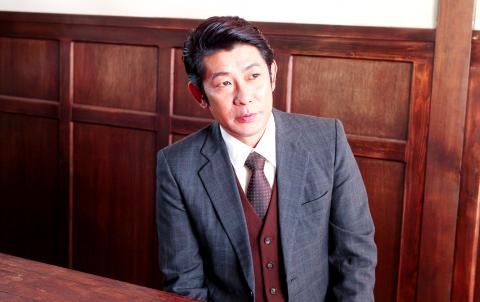Readers familiar with cult American films might remember Jim Jarmusch’s 1989 movie Mystery Train, which not only put the director on the world map but also turned the then-22-year-old Japanese actor Masatoshi Nagase — a high school drop-out from the countryside — into a star.
Fast forward to 2013 and Nagase is in Taiwan as part of the cast of Kano, a baseball drama about a 1931 Chiayi high school team. The film, backed by Wei Te-sheng (魏德聖), is directed by Seediq Bale (賽德克‧巴萊) alumnus Umin Boya.
Filming has been going on in five cities around Taiwan since November, from Chiayi to Keelung, and is set to wrap at the end of March.

Photo: Taipei Times
An all-Taiwanese cast comprised of mostly unknown faces, as well as four well-known Japanese actors playing pivotal roles, is bringing the Wei-scripted story to life.
Among the four Japanese actors, Nagase, now 46, has been cast as a strict Japanese high school baseball coach. During a recent press conference in Chiayi, Nagase said he was enjoying his time in Taiwan, even posting photos of various Taiwan scenic locations on his Facebook page.
big budget flick
Nagase told reporters at the conference in Chiayi that he was impressed by the Hollywood-style set that has been built in Chiayi, confessing: “A movie set of that size is rare even in Japan today.”
When asked by the Taipei Times if Jarmusch was aware of his starring role in Kano, Nagase said in English: “I’m not sure if he knows yet, but I hope he will find out later. I love Jim Jarmusch.”
According to the producers, over NT$50 million has been spent to build a 1931-era set, and there are plans to retain some of the Kano main street set as a tourist attraction before and after the movie opens next year.
a taste of old chiayi
There’s a huge wooden replica of an old Japanese-style Chiayi train station from the 1930s, complete with a bright red Japan Post Office collection box made of cardboard, several fake telephone poles with fake telephone wires strung up in the air, and emergency sand containers used to put out fires in the Japanese colonial period days before fire trucks and fire hydrants were put into service here.
The three other actors from Japan cast in the film are Takao Ozawa, Maki Sakai and Togo Ikawa.
Putting Nagase in Kano appears to be a stroke of casting genius since Jarmusch is a big name in America and Europe and it is hoped that Nagase’s star turn will bring in Western viewers to the baseball drama — not to mention his many fans in Japan where he has appeared on TV shows, movies and in an assortment of popular and often humorous TV commercials over the past 20 years.

April 14 to April 20 In March 1947, Sising Katadrepan urged the government to drop the “high mountain people” (高山族) designation for Indigenous Taiwanese and refer to them as “Taiwan people” (台灣族). He considered the term derogatory, arguing that it made them sound like animals. The Taiwan Provincial Government agreed to stop using the term, stating that Indigenous Taiwanese suffered all sorts of discrimination and oppression under the Japanese and were forced to live in the mountains as outsiders to society. Now, under the new regime, they would be seen as equals, thus they should be henceforth

Last week, the the National Immigration Agency (NIA) told the legislature that more than 10,000 naturalized Taiwanese citizens from the People’s Republic of China (PRC) risked having their citizenship revoked if they failed to provide proof that they had renounced their Chinese household registration within the next three months. Renunciation is required under the Act Governing Relations Between the People of the Taiwan Area and the Mainland Area (臺灣地區與大陸地區人民關係條例), as amended in 2004, though it was only a legal requirement after 2000. Prior to that, it had been only an administrative requirement since the Nationality Act (國籍法) was established in

With over 80 works on display, this is Louise Bourgeois’ first solo show in Taiwan. Visitors are invited to traverse her world of love and hate, vengeance and acceptance, trauma and reconciliation. Dominating the entrance, the nine-foot-tall Crouching Spider (2003) greets visitors. The creature looms behind the glass facade, symbolic protector and gatekeeper to the intimate journey ahead. Bourgeois, best known for her giant spider sculptures, is one of the most influential artist of the twentieth century. Blending vulnerability and defiance through themes of sexuality, trauma and identity, her work reshaped the landscape of contemporary art with fearless honesty. “People are influenced by

The remains of this Japanese-era trail designed to protect the camphor industry make for a scenic day-hike, a fascinating overnight hike or a challenging multi-day adventure Maolin District (茂林) in Kaohsiung is well known for beautiful roadside scenery, waterfalls, the annual butterfly migration and indigenous culture. A lesser known but worthwhile destination here lies along the very top of the valley: the Liugui Security Path (六龜警備道). This relic of the Japanese era once isolated the Maolin valley from the outside world but now serves to draw tourists in. The path originally ran for about 50km, but not all of this trail is still easily walkable. The nicest section for a simple day hike is the heavily trafficked southern section above Maolin and Wanshan (萬山) villages. Remains of